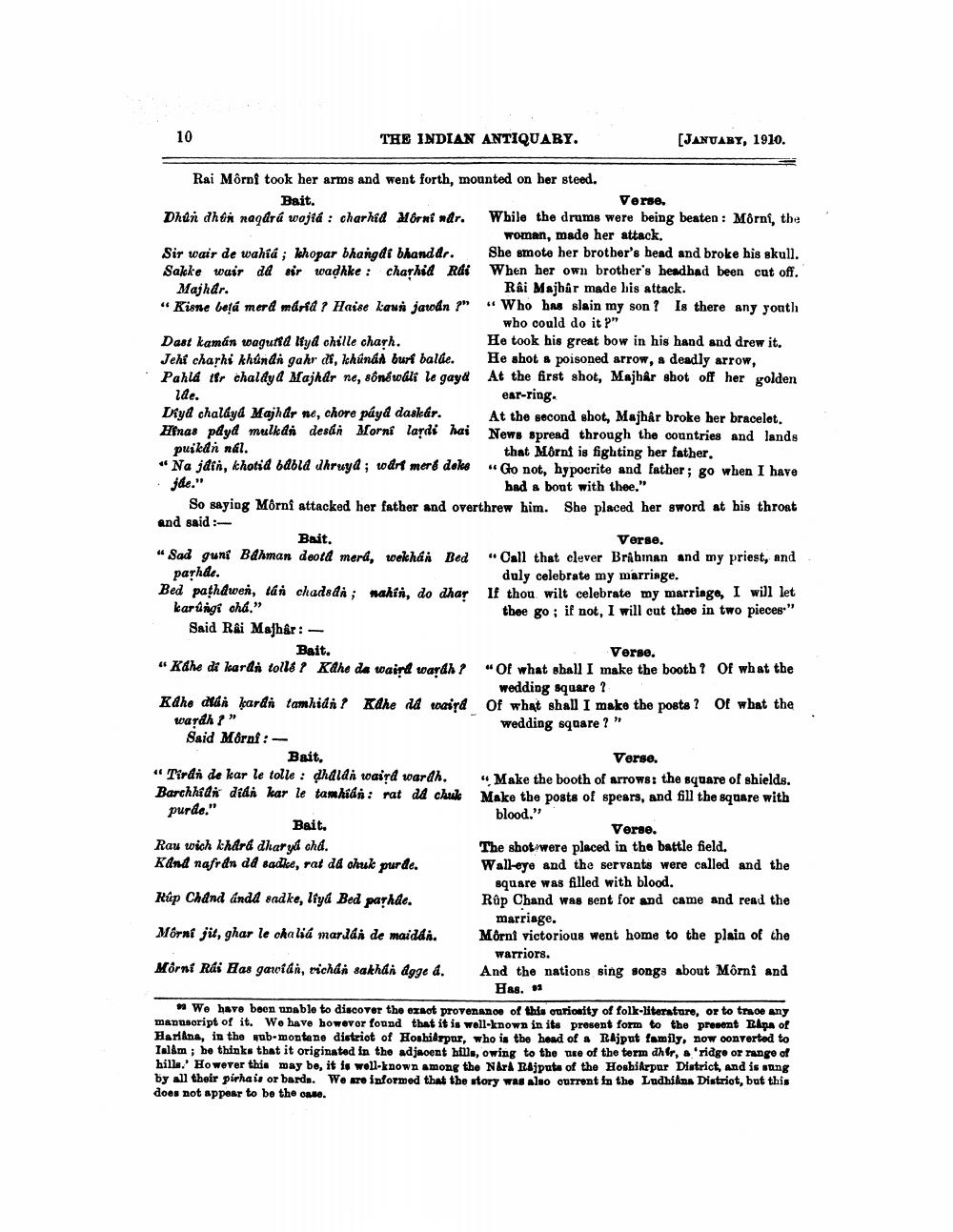________________
10
THE INDIAN ANTIQUABY.
[JANUARY, 1910.
Rai Môrni took her arms and went forth, mounted on ber steed. Bait.
Verse. Dhin dhen nagdrá wojtá : charhid Mornindr. While the drums were being besten: Môrni, the
woman, made her attack. Sir wair de wahiá; Ishopar bhangdi bhandar. She smote her brother's head and broke his skull. Sakke wair da wir wadhke : charhid Rdi When her own brother's headhad been cut off. Majhdr.
Râi Majbar made his attack. " Kisne betá merd mdrid ? Haise kans jarodn?" "Who has slain my son? Is there any yonth
who could do it P" Dast kaman wagutia lfyd chille charh.
He took his great bow in his hand and drew it. Jehí charhi khundi gahr df, Ichúnán burs balde. He shot a poisoned arrow, a deadly arrow, Pahlá tfr challyd Majhar ne, sônówali le gaya At the first shot, Majhar sbot off her golden ide.
ear-ring. Lyd chaláyd Majhar ne, chore páyd daskár.
At the second shot, Majhar broke her bracelet. Hinas pdyd mulk di desán Morni laydi hai News spread through the countries and lands puikdn nal.
that Môrni is fighting her father. Na jdin, khotid bdbla Jhrwyd ; to&rf meré doke "Go not, hypocrite and father; go when I have jde."
bad & bont with thee." So saying Môrni attacked her father and overthrew him. She placed her sword at his throat and said :Bait.
Verse. “ Sad guni Bahman dootd mera, wekhar Bed "Call that clever Brahman and my priest, and parhde.
duly celebrate my marriage. Bed pathawen, lan chadada; nahin, do dhar If thou wilt celebrate my marriage, I will let karungi cha."
thee go; if not, I will cut thee in two pieces." Said Rai Majhar :Bait.
Verse. "Kahe di kards tolls ? Kahe da waird wardh? " Of what shall I make the booth? Of what the
wedding square ? Kdho diák kardn tamhidh ? Kdhe da aid Of what shall I make the posts? Of what the wardh »
wedding square ?” Said Mornf:Bait,
Verse. "Tirdi de kar le tolle : dhaldi vaird wardh. 4 Make the booth of arrows: the square of shields. Barchhidi didi kar le tamhidi: rat de chaul Make the posts of spears, and fill the square with purde."
blood." Bait,
Verse. Rau wich khara dhar yi cha.
The shot were placed in the battle field. Kand nafrån då sadke, rat dd ohuk purde. Wall-eye and the servants were called and the
square was filled with blood. Rúp Chand anda sadke, lfyd Bed pathde. Rûp Chand was sent for and came and read the
marriage. Môrni jit, ghar le okaliá marián de maiddi. Môrni victorious went home to the plain of the
warriors. Mörni Rdi Has gauidi, vichda sakhda dgge d. And the nations sing songs about Môrni and
Has. We have boon unable to discover the exact provenance of this curiosity of folk-literature, or to trace any manuscript of it. We have bowovor found that it is well-known in its present form to the prosent Rape of Hariana, in the pub-montano distriot of Hoshidrpur, who is the head of a Rajput family, now oonverted to Islâm; he thinks that it originated in the adjacent hills, owing to the use of the term dhir, a'ridge or range of hills.' However this may be, it is well-known among the N&rl Rajpata of the Hoshiarpur District, and is sung by all their pírha is or bards. We are informed that the story was also current in the Ludhiana District, but this does not appear to be the one




